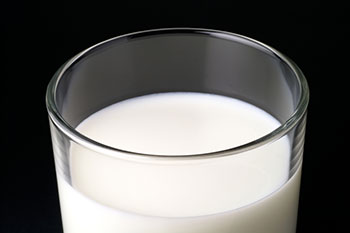More Health and Nutrition Bites
Related
Preventing fracture: more evidence against vitamin supplements
Most of the time when we talk about treating or preventing osteoporosis, we focus on building bone, whether it's by taking calcium and Vitamin D supplements or by building stronger bones through weight-bearing exercise. What we don't discuss nearly as often are those risk factors for osteoporosis that have little or nothing to do with the bone mass you created during youth and early adulthood.
Drinking milk may be bad for your bones
For years, if not decades, we have been told to drink our milk in order to build strong bones. Milk is a good source of calcium, Vitamin D, and phosphorus, all important nutrients for bone formation and maintenance, so many people are told that they should drink at least three glasses a day to help prevent fractures and osteoporosis.
Calcium & Vitamin D Supplements:
The Risk/Benefit Ratio
Not long ago I got an email from a Dr. Gourmet reader who was frustrated by some of my answers to Ask Dr. Gourmet questions. For example, the question about whether drinking diet soda is linked to obesity. There isn't a lot of evidence, and it certainly doesn't show that drinking diet soda will cause obesity, but it doesn't look like drinking soda of any kind is all that great an idea, especially when coffee, tea and water is definitely great for you.
Health & Nutrition Bites
Get the latest health and diet news - along with what you can do about it - sent to your Inbox once a week. Get Dr. Gourmet's Health and Nutrition Bites sent to you via email. Sign up now!
Drinking milk and risk of hip fractures

It's a tenet of nutrition, handed down from our parents and grandparents, and backed up by clever marketing campaigns. The specific message might vary, but the underlying belief is: "Drink milk for strong bones."
Milk contains a number of vitamins and minerals, not to mention protein and fat, and the presumption behind much of the research into bone health and milk has been, essentially, that:
1. Milk contains higher levels of calcium and vitamin D, and
2. Calcium and vitamin D are beneficial to bone health, therefore
3. Milk is beneficial to bone health
For decades this belief wasn't closely questioned - to the point that the USDA's MyPlate actually includes dairy milk as a beverage in its dietary recommendations.
More recent research, however, has looked at dairy intake (and more specifically at dairy intake in the form of liquid cow's milk) and any link there might be between a) consuming cows' milk itself or b) consuming supplements of calcium and Vitamin D and bone fracture. The results, however, have been mixed.
Back in 2014 I reported on a study that suggested that for women, higher intake of cheese and fermented dairy - not liquid milk - reduced their risk of fracture, while those who drank more than three glasses of milk per day increased their risk of fracture.
Worse yet, it would appear that taking calcium or vitamin D supplements in order to reduce the risk of fracture might actually increase your risk of heart attack or stroke.
With all of this conflicting data regarding milk, the components of milk thought to be bone-protective, and whether those protective components should be taken as supplements by themselves, for an Internist like me, who sees patients nearly every day, the really relevant question is the one my patients who are concerned about their bones often ask me: "Should I drink milk?"
Today's article was published in the British Journal of Nutrition (doi:10:1017/S0007114518003823) and is authored by a team of Norwegian researchers who analyzed data gathered through two large-scale, long term studies carried out in Norway.
The first source of data is known as the Norwegian Counties Study (with over 35,000 participants included in the analysis) and includes those participants from a larger cardiovascular health screening that recruited participants between 1985-86 and 1987-88. The second source of data comes from the Five Counties study (about 23,300 people included in the analysis), which includes 5 Norwegian counties of varying economic and locational areas, which began collecting data between 2000 and 2003 and continues to today.
Both data sources included at minimum the height, weight, and smoking data for all participants, and among other food groups queried the participants regarding their usual intake of milk, measured in "glasses of milk per day."
After an average of more than ten years' followup, the authors could access the country's hospital data to ascertain which participants might have experienced a hip fracture. They then compared the milk intake of those who fractured their hip with those who did not, taking into account such variables as Body Mass Index, age, gender, smoking status, chronic diseases, and other variables.
The authors found, and I quote from their discussion, "no clear association [either for or against] between milk consumption and risk of hip fracture."
What this means for you
These are results from people who are largely Caucasian, and the results could and probably are complicated by race, class, or more diverse gender. What this does suggest, to me, is that if you're drinking milk solely - or even mostly - for your bone health, you might reconsider. First, those glasses of milk may be calories you don't need, while the bone-related content of the milk (calcium, vitamin D) is likely available through other foods that offer you multiple other benefits, such as fiber or antioxidants (spinach is a good source of vitamin D, for example, and collards, broccoli rabe, and kale for higher in calcium foods).
First posted: February 20, 2018
